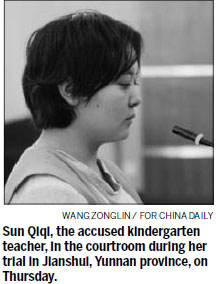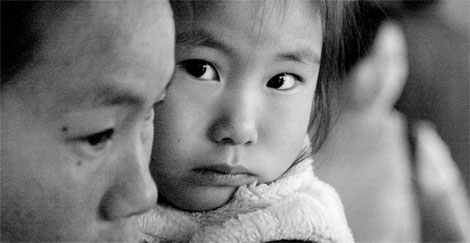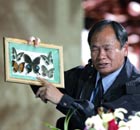Society
Teacher on trial for pricking students
By Li Yingqing, Peng Yining and Guo Anfei (China Daily)
Updated: 2010-03-06 07:58
 |
Large Medium Small |
|
A victim of kindergarten teacher Sun Qiqi's method of handing out punishment - pricking students with a syringe - pictured with her mother. Wang Zonglin / for China Daily |
KUNMING - A 22-year-old kindergarten teacher accused of pricking students with a syringe as a method to discipline them stood trial in a court in Yunnan province on Thursday.
Sun Qiqi, the accused, has reportedly confessed to pricking 63 students, aged between 3 and 6 years, of Xihu Kindergarten in Jianshui county.
Sun was charged with the crime of endangering public safety with dangerous methods. The trial ended on Thursday without a verdict.
Prosecutors said Jianshui county police arrested Sun on Oct 27, 2009, after receiving complaints that she pricked her students with needles if they were disobedient or made too much noise during naptime.
The police found a 5-milliliter disposable syringe in Sun's desk, which was dotted with needle holes, the indictment said.
The police said Sun poked needles into her desk to frighten students who were being naughty.
According to the police, Sun confessed to the crime but maintained she did not inject the students with any chemical.
A total of 24 students in Sun's class have been tested for HIV, and hepatitis B and C. None of the children have tested positive for any of the three diseases.
But the parents fear that their wards could have contracted other diseases. That apart, the incident has left the children psychologically scarred, which is bound to impact their future, they said.

Tan Linfu, father of a 4-year-old girl, who was once punished by Sun, said he has transferred his daughter to another kindergarten, but she is too afraid to go to school.
"When my daughter is upset, she threatens to prick me and her mother with a needle," Tan told China Daily.
Chen Jingqi, an expert at Peking University's school of public health, said Sun's method of handing out punishment was "an abuse of children".
"Pricking, or any type of violence, has serious physical and mental effect on children," she said.
In her 2005 research, Chen interviewed more than 4,000 students across China about their experience of being abused as a child younger than 16.
More than 38 percent said they were victims of physical abuse, like pricking, burning and beating.
Students who were abused in their childhood are more likely to be violent, suicidal, and alcoholic, according to Chen's research.
He Xin, director of the Jianshui Education Bureau, said Sun "did not have a permit to teach" and Xihu Kindergarten, which has 140 students, has yet to receive a business license.
He added that the kindergarten has been shut down and the government will take measures to ensure similar incidents are prevented.
"I had no idea the kindergarten doesn't have a license," said Zhou Limei, mother of a 4-year-old girl who was pricked with needles at least five times.
"Keeping children safe should be the top priority for any kindergarten," said Professor Yu Yongping, an expert in preschool education from Nanjing Normal University. "Although not widespread, such illegal kindergartens do exist in a number of places. Cases of abuse are usually found in unregistered institutions."
"It is the government's responsibility to keep a close watch and shut down illegal schools. But the parents, too, should find out if the school they're sending their child to has a license to operate or not," Yu said.








